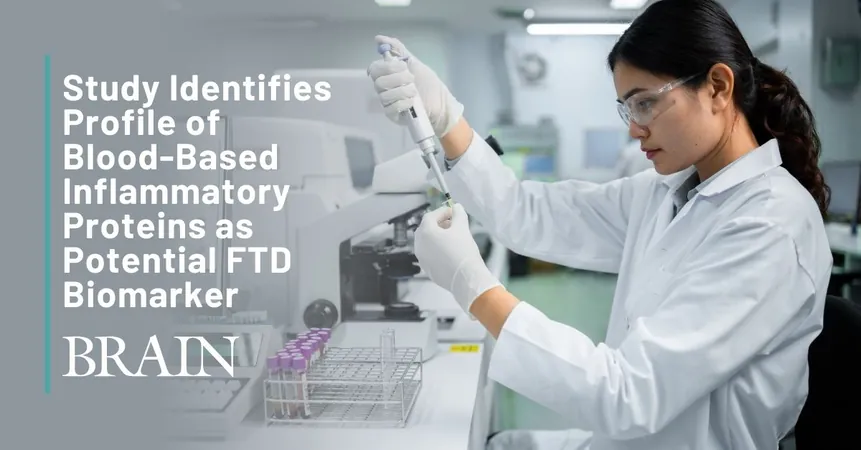
Breakthrough Study Unveils Blood Test as a Game-Changer for Diagnosing FTD
2025-05-28
Author: Wei Ling
Transforming FTD Diagnosis with Blood-Based Biomarkers
In a groundbreaking study published in the prestigious journal *Brain*, researchers have identified a revolutionary profile of inflammatory proteins in blood that could change the game in diagnosing Frontotemporal Dementia (FTD). This innovative approach highlights blood serum samples as a more accessible alternative to traditional diagnostic methods, promising a significant leap forward in gauging disease severity.
The Link Between Neuroinflammation and FTD
Neuroinflammation is a key player in the progression of FTD, with the brain's immune cells releasing pro-inflammatory proteins known as cytokines. While this immune response may initially protect the brain, persistent neuroinflammation can lead to severe neuronal damage, worsening the disease. Understanding the intricate protein profiles linked to FTD is essential for creating effective disease-progression strategies and optimizing clinical trials.
Why Blood-Based Biomarkers Matter
Current biomarker assessments like PET scans come with high costs and accessibility issues, limiting their use in many clinical centers worldwide. In contrast, the ease of blood tests allows for scalable and cost-effective diagnostics, paving the way for broader applications in monitoring FTD.
The Study: Comprehensive Sampling and Analysis
To explore the correlation between blood cytokine levels and FTD severity, the researchers analyzed blood samples from 214 participants diagnosed with various forms of FTD. This diverse group included individuals with behavioral variant FTD (bvFTD), progressive supranuclear palsy (PSP), corticobasal syndrome (CBS), along with semantic variant PPA (svPPA) and nonfluent/agrammatic variant PPA (nfvPPA). Additionally, a control group of 29 individuals was included for comparison.
Exciting Findings: Cytokine Levels as Indicators of Severity
The research yielded compelling results, revealing that elevated levels of cytokines in the blood effectively differentiate FTD patients from controls across all forms of the condition. The analysis demonstrated a direct correlation between higher cytokine levels and increased disease severity, offering clinicians a potential tool to predict patient outcomes.
Key Discoveries from the Cytokine Profile
Here’s a quick snapshot of cytokine levels across different FTD disorders compared to controls: - bvFTD: 4.94 - PSP: 4.37 - CBS: 4.77 - nfvPPA: 5.49 - svPPA: 3.55 Although the elevated cytokine markers are not specific to particular FTD subtypes, they underscore a shared inflammatory response that could inform immunotherapy development for multiple forms of the disease.
The Future: Biomarkers and Clinical Trials
While the research opens doors for improved diagnostics and treatment strategies, it also highlights the need for comprehensive approaches. The unique topographical insights offered by imaging techniques like PET scanning are irreplaceable, yet the identified blood biomarkers could enhance prognosis determination. Organizations like AFTD are championing research initiatives to further explore these potential markers, aiming for effective solutions in the fight against FTD.
Conclusion: A Ray of Hope for FTD Patients
As researchers delve deeper into uncovering reliable biomarkers for Frontotemporal Dementia, findings like these stand as a hopeful beacon for patients and their families. The future of FTD diagnosis may lie within a simple blood test, making it easier than ever to monitor and address this complex disease.





 Brasil (PT)
Brasil (PT)
 Canada (EN)
Canada (EN)
 Chile (ES)
Chile (ES)
 Česko (CS)
Česko (CS)
 대한민국 (KO)
대한민국 (KO)
 España (ES)
España (ES)
 France (FR)
France (FR)
 Hong Kong (EN)
Hong Kong (EN)
 Italia (IT)
Italia (IT)
 日本 (JA)
日本 (JA)
 Magyarország (HU)
Magyarország (HU)
 Norge (NO)
Norge (NO)
 Polska (PL)
Polska (PL)
 Schweiz (DE)
Schweiz (DE)
 Singapore (EN)
Singapore (EN)
 Sverige (SV)
Sverige (SV)
 Suomi (FI)
Suomi (FI)
 Türkiye (TR)
Türkiye (TR)
 الإمارات العربية المتحدة (AR)
الإمارات العربية المتحدة (AR)